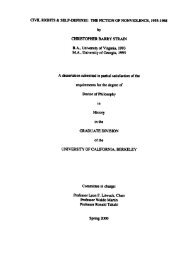Negro Digest - Freedom Archives
Negro Digest - Freedom Archives
Negro Digest - Freedom Archives
You also want an ePaper? Increase the reach of your titles
YUMPU automatically turns print PDFs into web optimized ePapers that Google loves.
J. .JICLCfj ._Jd .L'~ .FU~~e ;<br />
one of the examples of white snobbishness<br />
lurking behind the criteria<br />
of excellence which, by no means<br />
however, is entirely a product cf<br />
racism alone . Running through its<br />
history also is a strain fundamentally<br />
of a different sort, though it too<br />
is racial, by coincidence, in its consequences<br />
.<br />
In the beginning American education,<br />
particularly on the college<br />
level, was highly private, restricted<br />
to the few who were wealthy<br />
enough to afford it . Such persons,<br />
as social theorist Thorsten Veblen<br />
observed in his book, The Theory<br />
of the Leisure Class, were characterized<br />
by a peculiar mentality in<br />
which, owing to the necessity for<br />
displaying one's wealth, it was<br />
prestigious to be free from productive<br />
endeavor. Any work done<br />
could not be remunerative and<br />
preferably should be of no significant<br />
use to anybody, let alone oneself<br />
; to waste time, and to have the<br />
time to waste time were the symbols<br />
of prestige . Their educational<br />
enterprise, accordingly, was characterized<br />
by a "liberal arts" approach<br />
where students learned a<br />
little about a lot of things and a lot<br />
about nothing. The leisure-class<br />
syndrome and its snobbish motivations<br />
encouraged a preoccupation<br />
with lofty gobbledygook such as<br />
footnoting. Students might be compelled<br />
to labor in memorizing the<br />
idiomatic expressions and the verbal<br />
conjugations of dead languages ;<br />
or, more currently, languages<br />
NEGRO DIGEST Morch 1969<br />
(Continued from page 43)<br />
which invariably fade from the student's<br />
memory and, while remembered,<br />
are useless in post-college<br />
life .<br />
As middle class aspirants began<br />
to emulate the leisure class, and<br />
education was largely socialized,<br />
the principle of exclusiveness was<br />
reinforced by the need to stem the<br />
flood of recruits to professional occupations<br />
. Hence the student might<br />
make A's and B's in all required<br />
courses only to fail the comprehensive<br />
exam or the language test, or<br />
pass all academic requirements<br />
only to fail the bar exam because<br />
of political beliefs or color of skin .<br />
Education lost much of its capacity<br />
for vitalizing the mind and, since<br />
the end-products became more important<br />
than the process, eventually<br />
amounted to a routine assimilation<br />
of approved bodies of knowledge,<br />
a process which fails particularly<br />
to inspire a black child of<br />
working class origin .<br />
I sometimes shock students into<br />
a realization of the shallowness of<br />
the American college scene by<br />
walking into a classroom and throwing<br />
out a concept, preferably with a<br />
German-sounding name, such as<br />
zeitschaft (whether this is a word<br />
I do not know) which I might<br />
claim to be a concept for a societal<br />
condition in which there is widespread<br />
feelings of racism or intergroup<br />
hostility . While students are<br />
busy copying down the term, I proceed<br />
to show how to measure the<br />
intensity of the zeitschaft predica-<br />
9t
















